RIO DE JANEIRO, BRAZIL – The fires devastating the Amazon and attracting global attention are only the most visible aspect of the exploitation of the largest rainforest in the world. Behind deforestation and fires are powerful economic interests: cattle ranching, illegal timber trade, and soy production. Some of these products are bound for Europe.
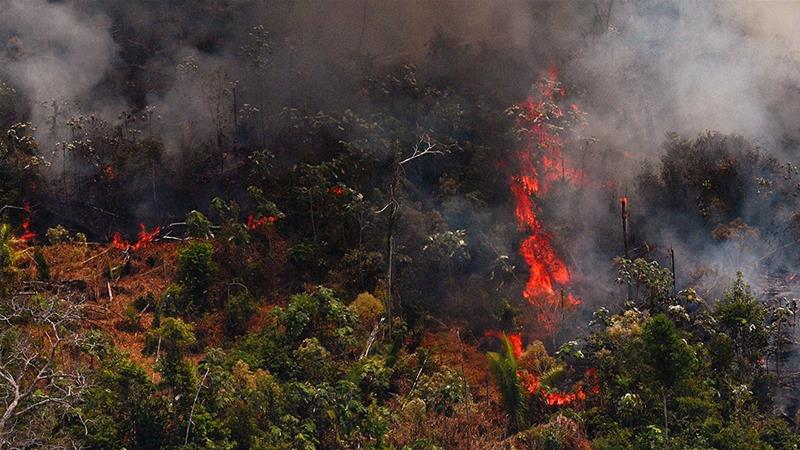
French President Emmanuel Macron dubbed the fires an “international crisis,” a statement that was construed as a rise in the tone of European countries’ threats to the purchase of Brazilian products.
The link between the international market and fires is not straightforward, as Europe has been buying products from illegally deforested areas for years, according to Repórter Brasil in several reports.
Fires are part of the process of clearing pastureland, which starts by cutting down the forest with tractors and chains, then drying and burning, and ends with the planting of grass to feed animals, according to Erika Berenguer, a senior researcher at Oxford University’s Institute for Environmental Change. After replacing trees with cattle, the land could be used for farming, says the researcher, who has been studying burning in the Amazon for the past ten years.
If in the 1970s only one percent of the Amazon had been deforested, today the rate reaches twenty percent, according to a report by the Environmental Attorney of the Federal Prosecutor’s Office.
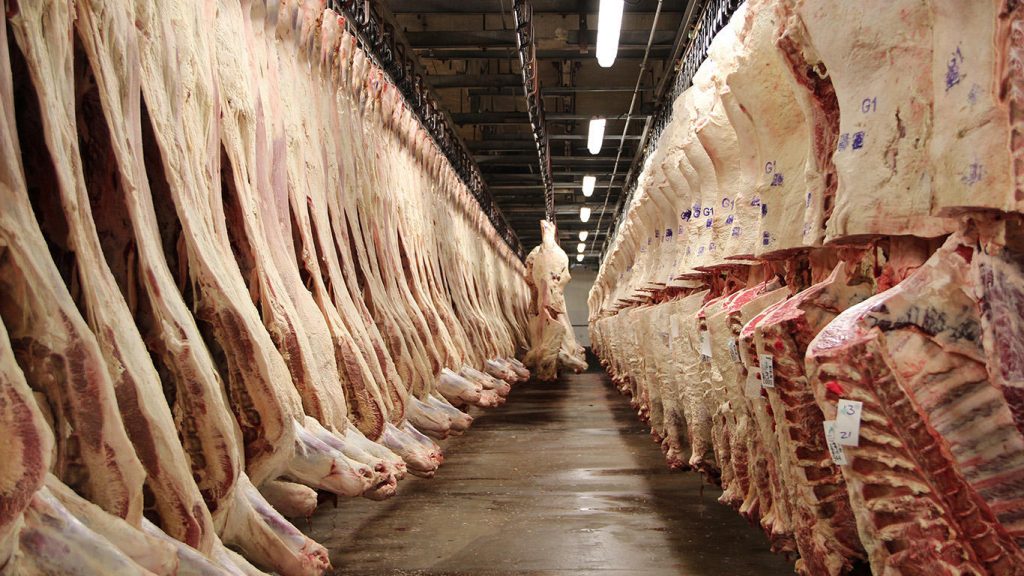
The forest destruction has followed the evolution of cattle ranching in the Amazon, which increased from 47 million animals in 2000 to around 85 million today. Almost forty percent of the country’s 215 million head of cattle graze in Amazonian areas. According to the report, cattle ranching accounts for eighty percent of the region’s deforested area.
Economic exploration of the Amazon is behind the 40,000 fires that affected the forest between January 1st and August 23rd, as detected by the National Institute for Space Research (INPE). This is the highest fire rate since 2010.
The increase in the number of fires occurs amidst measures taken by president Jair Bolsonaro’s government, such as reducing environmental inspections, budget cuts for the Environment Ministry, and challenging the official data on deforestation. The measures, combined with the fires, could hurt agribusiness and the trade agreement between the Mercosur and European Union countries.
Contrary to what Environment Minister Ricardo Salles had claimed — that the fires are due to “dry weather, wind, and heat,” — INPE data suggest that the fires have been caused by deforestation, according to researchers from the Amazon Environmental Research Institute (IPAM).
Beef Giant JBS with Concrete Interests
Not coincidentally, the current fires in the Amazon occur in areas typically reserved for pasture or soybean plantations. A scientist from the NASA space agency pointed precisely to the location of the heat sources detected in August.
“[Satellites show] huge smoke columns coming out of those agricultural border areas, such as Novo Progresso, the Midlands region of Pará, and the southeast of the state of Amazonas,” Douglas Morton told Folha de S.Paulo, adding that the last time satellites detected similar devastation was in 2004.
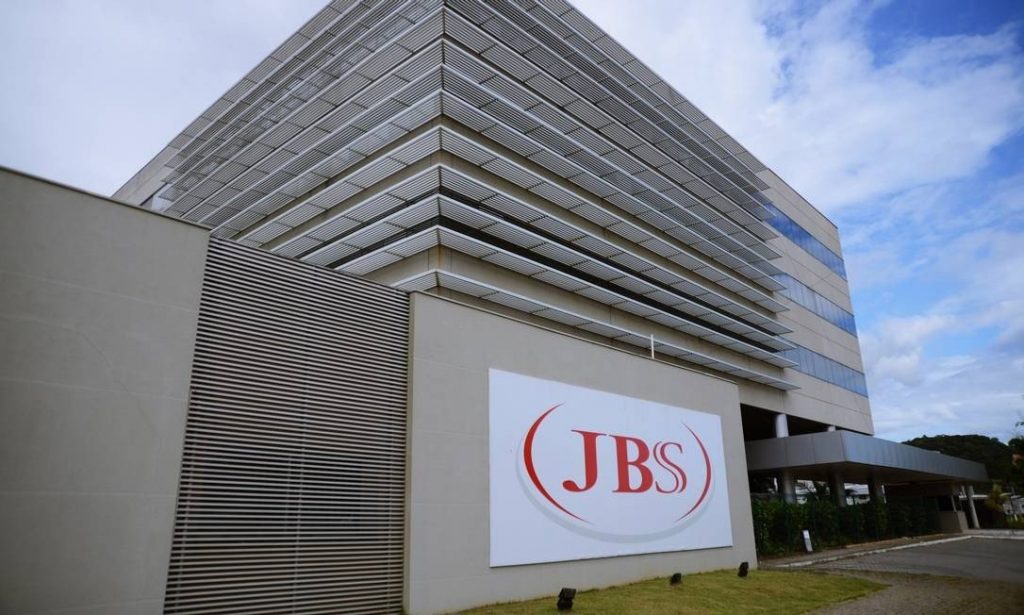
Located in the Xingu River basin, Terra do Meio is endangered by the advancing deforestation in the Pará municipality of São Félix do Xingu, which has the largest cattle herd in the country, with 2.2 million heads. There, JBS, the global beef production giant, was found to be buying cattle from an economic group fined by IBAMA for deforesting the Amazon.
This is AgroSB, one of the largest cattle producers in the country, which was fined R$69.5 (US$17.5) million for illegal deforestation on its farms in São Félix do Xingu between 2010 and 2019, as evidenced in July by an investigation by Repórter Brasil in partnership with the British newspaper The Guardian. The company, which is part of Daniel Dantas’ Opportunity banking group, is one of JBS’ cattle suppliers.
It was not the first time that JBS bought cattle from groups involved in deforestation. In 2017, the animal protein producer bought cattle from Jotinha, a nickname for Antônio Junqueira, who operated the most massive illegal deforestation scheme in the region associated with land grabbing in the history of the Amazon, according to an operation carried out by the Federal Prosecutor’s Office (MPF).
Repórter Brasil, in partnership with The Guardian, denounced the export of deforestation-linked meat and led the British market Waitrose, England’s seventh-largest, to remove the Brazilian company’s meat from its shelves.
Contacted, JBS replied that it upholds its position at the time the reports were published when it stated that, “as soon as it was informed of the irregularities, all cattle purchases from the Junqueira family were promptly interrupted.”
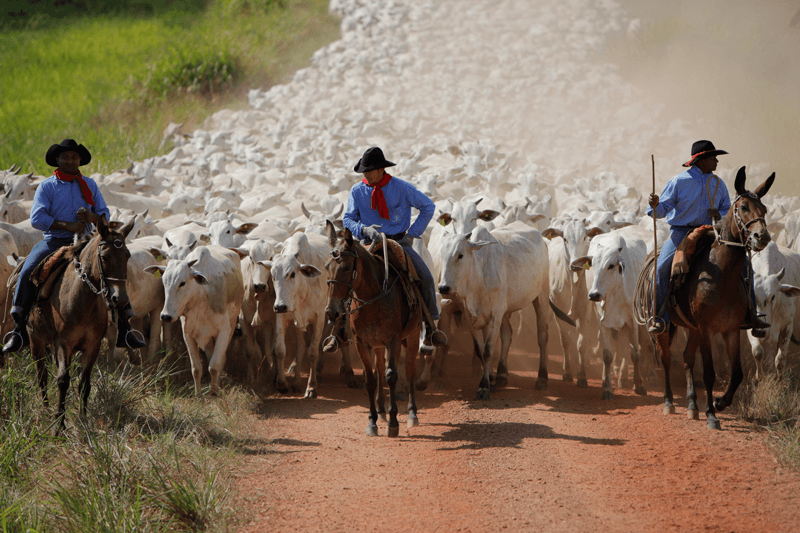
On the purchase of animals from AgroSB, JBS reported that “the facts pointed out do not correspond to the standards” adopted by the company. The company said that it does not buy animals from farms involved in deforestation or that are embargoed by IBAMA. The company stresses that it maintains a reliable monitoring system for its cattle suppliers.
AgroSB, also in a note published at the time of the report’s publication, stated that it had bought the Lagoa do Triunfo farm in February 2008 and that it “never performed any clearing of vegetation on the property.”
“AgroSB’s business model is anchored in the purchase of open and degraded pasture areas, which are fertilized, rehabilitated, and converted into high-intensity pastures or grain plantations,” adds the note.
Soybean Plantations in Bushland
While cattle ranching is concentrated in the states of the Legal Amazon, the majority of soybean plantations cover savanna areas. However, part of the grain plantations is in the north of Mato Grosso, with an Amazonian biome.
In the city of São José do Rio Claro in Mato Grosso, for instance, Repórter Brazil flagged a landowner denounced and fined for slave labor and illegal deforestation, exporting soy protein to Norway. In the Nordic country, soybeans were used as feed in salmon farming.
Although to a lesser extent, soybean plantations also contribute to forest destruction.
In 2018, the then Minister of the Environment, Sarney Filho, published a study showing that the grain illegally occupies 47.3 thousand hectares of deforested forest in the Amazon — an increase of 27.5 percent over the previous harvest (37.2 thousand hectares).
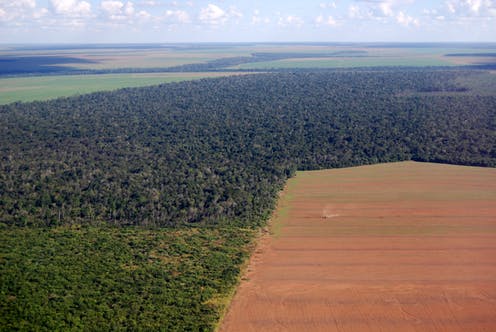
Operation Shoyo, carried out in October 2016 by IBAMA, investigated buyers of “pirate soy” in Mato Grosso — soybeans produced in embargoed areas and which, therefore, cannot be used for agricultural activities. The operation resulted in fines of R$170 million for planting in restricted areas and the sale of 148,643 bags of grains (soybeans and corn).
The data are part of the Future in our hands & Rainforest Foundation Norway Report — 2018 Salmon on soybeans — Deforestation and land conflict in Brazil.
The Brazilian Association of Soy Producers (Aprosoja Brasil) released a note on Friday, August 23rd, in which it condemns the occurrence of forest fires in the Amazon in areas of vegetation and agricultural production in the north of Brazil.
Repórter Brasil and the Danish journalistic organization Danwatch joint investigation into illegal logging in the Amazon, disclosed last year, that companies from that country bought products from Brazilian exporters fined several times by IBAMA.
There is evidence that international supplier networks are not adequately monitoring these crimes.
Agribusiness has Deep Pockets
Brazilian agribusiness has close ties with the political class. JBS was one of the largest funders of political campaigns in 2014. Company executives assumed responsibility in allegations that involved over R$500 (US$125) million to help elect governors, state and federal deputies, and senators from across the country.
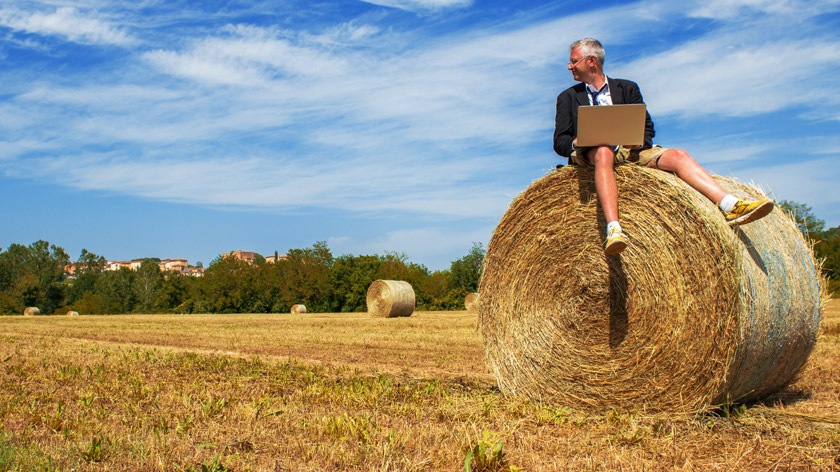
Although the company owning the Friboi and Swift brands was not directly fined for deforestation, it retains among its direct and indirect supplier network several groups fined for the crime.
After the arrest of JBS owners Joesley and Wesley Batista in 2017, the company stopped funding campaigns, but executives linked to companies that were fined by IBAMA for environmental crimes — which includes illegal deforestation — donated to campaigns of at least 117 deputies and elected senators, totaling R$4.2 million.
Among those financed by deforesters, there are prominent figures such as the current Chamber president, Rodrigo Maia, and the former Senate president, Renan Calheiros.
The exclusive survey conducted by Repórter Brasil cross-referenced data from IBAMA and the Federal Treasury and was published on February 5th this year. The study includes environmental crimes in all the regions of the country and not only in the Amazon.
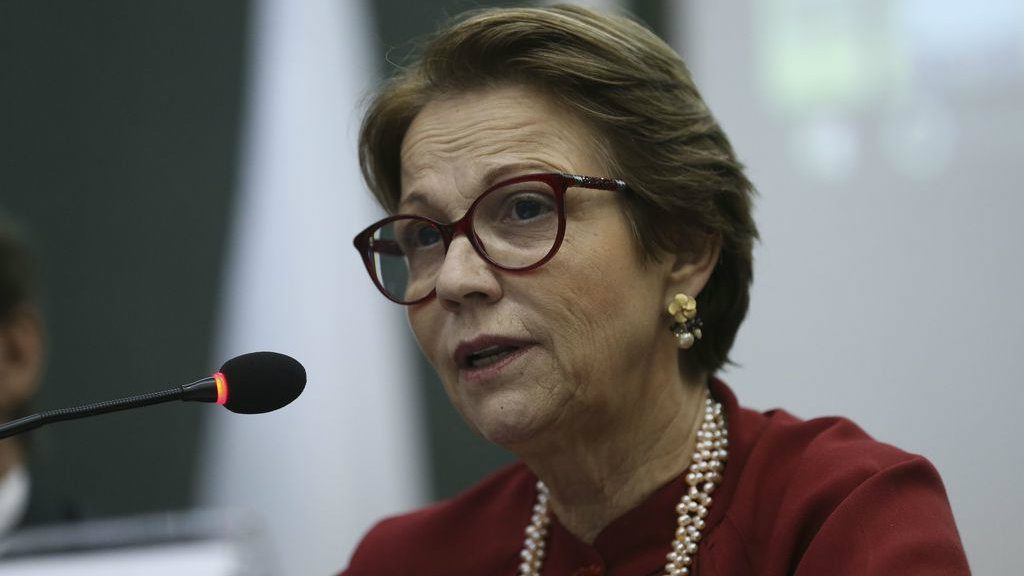
Agriculture Minister Tereza Cristina said on Friday, August 23rd, that fires occur throughout the year in Brazil. She emphasized that it cannot be said that Brazilian agribusiness is the “great destroyer” of the Amazon due to the fires that are currently taking place in the region.
“Today, there is a global concern with the environment. Brazil is also concerned. And rural producers are also concerned because they are the greatest losers, especially those who use technology,” said the minister.

